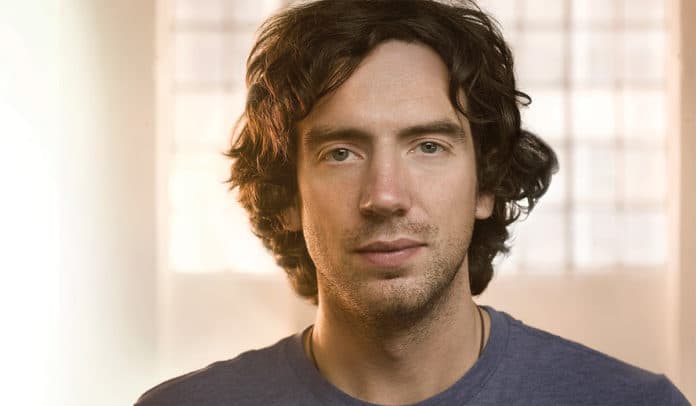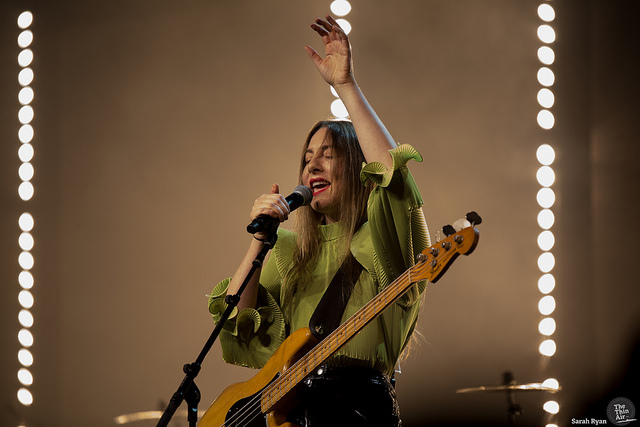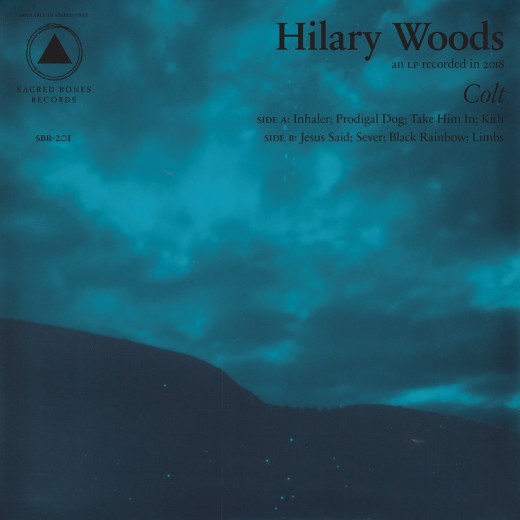A remarkably purgative release born from addiction, vulnerability and recovery, the Jacknife Lee-produced Wildness marks Snow Patrol’s long-awaited return after seven years. Striking a midpoint between the band’s evolved pop-rock prowess with lyrics tackling darkness, alienation and living in the moment, it’s an album capturing the Gary Lightbody-fronted band at both their creatively inspired in years.
In a conversation with Brian Coney, Lightbody discusses addiction, success, writer’s block, confronting one’s demons, whittling 600 songs down to 20, the importance of patience, as well as why he has no desire to write another ‘Chasing Cars’.
Wildness is Snow Patrol’s first album in seven years. But does it feel that long?
It’s funny because in some ways it feels like no time at all. And in other ways it’s an endless, undefinable amount of time that it almost feels like we’re starting from scratch again. I’m not sure how I feel about either of those things but in terms of live, we’re sounding better than we’ve ever sounded, so that feels like a regeneration in a lot of ways. The album feels like that, too. In terms of a personal thing, I went through the mill to make this record. It broke me a lot of times but it put me back together as well.
Was that pressure you put on yourself, the record company, a precedent you set with previous albums or was it a combination of all of those things?
Nobody put any pressure on me. The rest of the guys in the band didn’t put any pressure on me, the record company didn’t, the management didn’t – it was really just the pressure I put on myself, really. That’s the only thing that was on my mind. I was aware that, whether they were saying it or not, people were waiting for something. It was nagging at me. I didn’t have access to writing at that time. I start writing in 2013 and four of those five years were spent unable to write songs for Snow Patrol, really.
I don’t like the phrase writer’s block but was it that, or did it stem from what you had been dealing with in your own life?
I think it was deeper than writer’s block because I didn’t have anything to write about – that’s what I felt. I feel like writer’s block is when you have a subject and you can’t put your finger on what you want to write about or the words won’t come. With this, it was more a case of me not knowing what I wanted to write about, at all. I guess getting sober was the first step to unlocking what I needed to write about. But at that stage I didn’t even know. The two things were running parallel to one another and then they starting turning inwards towards each other and would eventually meet. But at that stage it was still parallel lines. I was trying to get myself right and not really thinking about the music. They intertwined at one point.
There is almost an expectation for artists who are playing night after night to drink; to keep things going and ticking over. In terms of getting sober, did you have an epiphany when you were on hiatus or was it something that happened when the band was active?
In 2007, we were in the middle of the Eyes Open tour in America and it was pretty intense. We were doing three acoustic sessions at different radio stations every day, and then the gig at night, and press and whatnot in every city that we were in. I lost my voice, and I was drinking every night, as well. Me being an idiot at the time, I thought, “Well, how have I lost my voice? It’s always been there.” So I went to a doctor and it turned out I had polyps at the time. Long story short: we had to take a break and rescheduled those shows. We took a month off and I saw a vocal coach for the first time. Snow Patrol had been going for 14 years at that point and I never had any vocal training – kind of like Ferris Bueller, “never had one lesson”. I would advise every singer to go see a vocal coach, for your own sanity and for the health of your own voice. We’re all young at one point and we all think that we’re invincible, but it doesn’t last forever. There’s a finite amount of times you can drive the thing in fifth gear with a fucking foot on the floor before you run out of gas.
Since then, I stopped drinking on tour, unless I had a day or two off after a gig. But when we were off tour – in those days it was only every a week or two, or maybe a month between tours if we were lucky – I would have a bunch of fun. But unfortunately when the tour finished in 2012 and there’s no album until 2017, that’s an awful lot of time spent having that fun. What happened in that time was that in the first five years of those seven years I drank excessively, almost every day. Certainly running up until when I stopped drinking, I was drinking every day. Initially I had to stop due to a medical thing, but I then wanted to stay stopped, because I started to become aware of life happening. Before, I was burying life in booze.
When you were writing lyrics for the album, which was obviously over a period of time, were you reluctant to be vulnerable? Did you consciously think, for example, “Ok, I’m going to delve into issues with depression on this song”, or “I’m going to confront my struggles with alcohol on this song”?
Garret (“Jacknife” Lee) played a lot of music in the studio during downtime in the studio. At one point, he put on Nick Cave’s new album at the time, Skeleton Tree. At the end of the first track, ‘Jesus Alone’, I just put it on again. And again and again. We listened to it about ten times. Jacknife and Nathan (Connolly, Snow Patrol lead guitarist/backing vocalist) saw me starting to write something so they were to the shop and said they’d be back in half an hour. By the time they got back I’d written ‘A Youth Written In Fire’, which is my favourite song on the record, and that’s when I knew what the record needed to be about. It needed to strip away everything and just let all of the things that I had been afraid of, all of the things that I had been running from, all of the things that I wanted to hide from people, because I was scared that they would be appalled by the thoughts that were going on my head – I had to let it all spill out. It was kind of liberating, and terrifying, in its own way, to realise that this is what I had to do. It was the only thing that was finally going to scratch the itch of this record. It was a case of “Bare everything. It doesn’t matter.”
I remember whenever Snow Patrol exploded back in 2004 with the release of ‘Run’. A lot of people were taken by how joyous that song, and Final Straw generally, was. Now, your music still has that, but it now confronts what makes so many of us – from mental health, addiction and far beyond – vulnerable. Do you feel that people can benefit from how open you are on this album?
I would never presume to guess what would be going on in somebody else’s life, and I hate it when other people try to guess what’s going on in mine. But in terms of the experiences that I’ve already had with this record, such as meeting people after shows, a lot of people have been very sweet and asking how I am. I’m fine, by the way, everybody – I really am. I’m better than ever. But they’ve also been saying that because of what I’ve said and what I’ve written, that they have found it easier to talk about stuff that they’ve not been able to talk about. It does mean an awful lot to me.
Many musicians strive to be great at crafting great pop songs. It’s something that you naturally excel at. But did you approach the whole songwriting process differently on this album, or did you go at it like you always did in the past?
I wrote a lot of songs for this record. The lyrics as I say was a bigger case of writer’s block and they didn’t come easy, but the music came quite easily. I wrote over 600 songs that we whittled down to 20 that we recorded. A lot of them took themselves out of the running by not being good – a hell of a lot of them – but for me it’s always been a case of always writing and writing and writing and writing. Most of the time, you immediately know when a song is going to work, and that’s maybe 1 in 10 or 1 in 20. If you’re lucky. Fucking hell, it’s probably much bigger than that. 1 in 50? I don’t know. But it’s funny because people reading this might think, “Well, why keep writing if it’s not coming?” But one thing leads to another. I’m very aware of not trying to take shortcuts, because I never took shortcuts before.
What kind of shortcuts?
Like a template. People sometimes say to me, “Do you ever think of writing another ‘Chasing Cars’?” and I’m like, “No, because I don’t know how.” It’s like, yes, I could write a song exactly like ‘Chasing Cars’, or something that approximates it. But what would be the point? There would be no point artistically. There would be no point – well, I don’t even think about things commercially, or at least not until they’re about to come out, and I think, “Well, is there a single we can put out?” It would be such a hollow experience to try to emulate something that we’ve done before. I actually got asked in a recent interview, “Do you think you’ll ever have the same success again that you had with ‘Chasing Cars’?” The answer to that question is, honestly, no. How could you? It was a moment.
On this album, there’s a lot of subtlety and there’s a lot of depth to songs, as well as experimentation in terms of instruments that are used. But at the heart of it is really catchy songs. You said ‘A Youth Written In Fire’ is your favourite track on there. Why is that?
What it symbolises – that letting go of the fear of talking about something that I’ve found so hard to talk about. I was drinking on my own. A lot. People didn’t know. The band didn’t know. I was taking drugs on my own a fair bit. It’s that fear of being found out, when what was I afraid of? Nobody went, “You fucking asshole!” Nobody. Not a single person. And even if somebody did, what does it matter? Did I used to think I was an asshole? Yes. I had a lot of self-loathing and a lot of self-hatred. But I don’t have it anymore. Nor do I think I’m the shit, either. I just have a normal amount of appreciation for myself, and I think it’s healthy to actually like yourself and enjoy being in your own company. If you are in your own company and you hate yourself and can’t look at yourself in the mirror, and every time you do, you think, “You’re a fucking cunt”, that is a dangerous place to be. You need to speak to somebody. You need to reach out. You need to fucking change the pattern that you’re in. Which is what I’ve done and I hope that I’ve conveyed that on this record.
But yes, that’s what that song means to me. It’s the first song that I properly wrote for the album. It took a long, long time – it’s almost an album within itself, because of the amount of time it took to write. When it came, it came to me in twenty minutes. It was like, “This is still in me. This is how I used to write songs.” I still have that fucking muscular twitch, that I can turn on. Like Usain Bolt, I can still run the 100 metres. Not that I want to compare myself to elite athletes, but actually, I suppose I’m more of a Mo Farah style-runner nowadays. But, now and again, I still have the other side to me, too. I can still run the sprint.
More than ever before, there are so many younger bands and artists striving for success, fame, validation, financial reward and all the rest. From your own perspective, what advice would you give to younger artists who feel like they have the musical ability, but just not the means or luck to make it happen?
Don’t rush it. Don’t let your ambition get the better of your good sense. I think until you get ten or twenty people that you trust telling you that you’re fucking awesome, don’t be doing anything rash. I can’t speak for pop music as it seems to be this constant carousel of people coming in and going out, but with bands, it’s really important that the thing that you want from your career, even if you don’t know you want it, is endurance. You want longevity. You might know that you want but you do. You fucking do. You have to have patience for that. Patience that was beaten into me, not given to me gently. If I could give anybody advice, it’s to try and just to take your foot off the gas, just a little bit, make sure you have great songs, make sure you’ve played your fucking socks off to no one before you play to someone. We played to fucking one person one night. We played to twenty people one night. We played so many of those gigs that we thought that nothing was ever going to happen. And, sometimes, you also have to be fine with the fact that might be the case. It took us ten years to have a hit, and there was plenty of times during that period that I thought it was never going to happen. I got to a place in myself that I thought, “Well, that’s just it. It won’t happen.” That’s when it fucking happened. It’s hard to define the endurance thing, but I would say that if you think that you have an album when you only have ten songs, you’re wrong. You’re absolutely, 100% wrong. You have an album when you have 100 songs. Write as many songs as you possibly can before you pick ten.
Obviously, your perspective has shifted over the years. There’s been different versions of Snow Patrol: pre-success, success, massive success, downtime and now your return. But what is it that motivates you nowadays?
We’ve already been lucky with this album run. Belfast was a moment. So was Derry. Cork was another. It was a strange one because we hadn’t played Cork in a long time and we didn’t know what to expect and it was a fucking amazing gig. It was at the Opera House – a beautiful, beautiful place. Those are the moments. There’s going to be some other moments that we’re not going to enjoy and that’s just the way life is. I think I’m just trying to be as level-headed as possible. I used to be someone who was trying to predict the future all of the time. “What if this happens? What if that happens?” That is the biggest waste of time in any pursuit that anyone could possibly ever do. Whatever is going to happen is going to happen. That’s why I don’t look too far ahead in the diary these days. I used to be counting the days on a tour and stuff but maybe that shows you that we weren’t in the right place.
Wildness is out now






